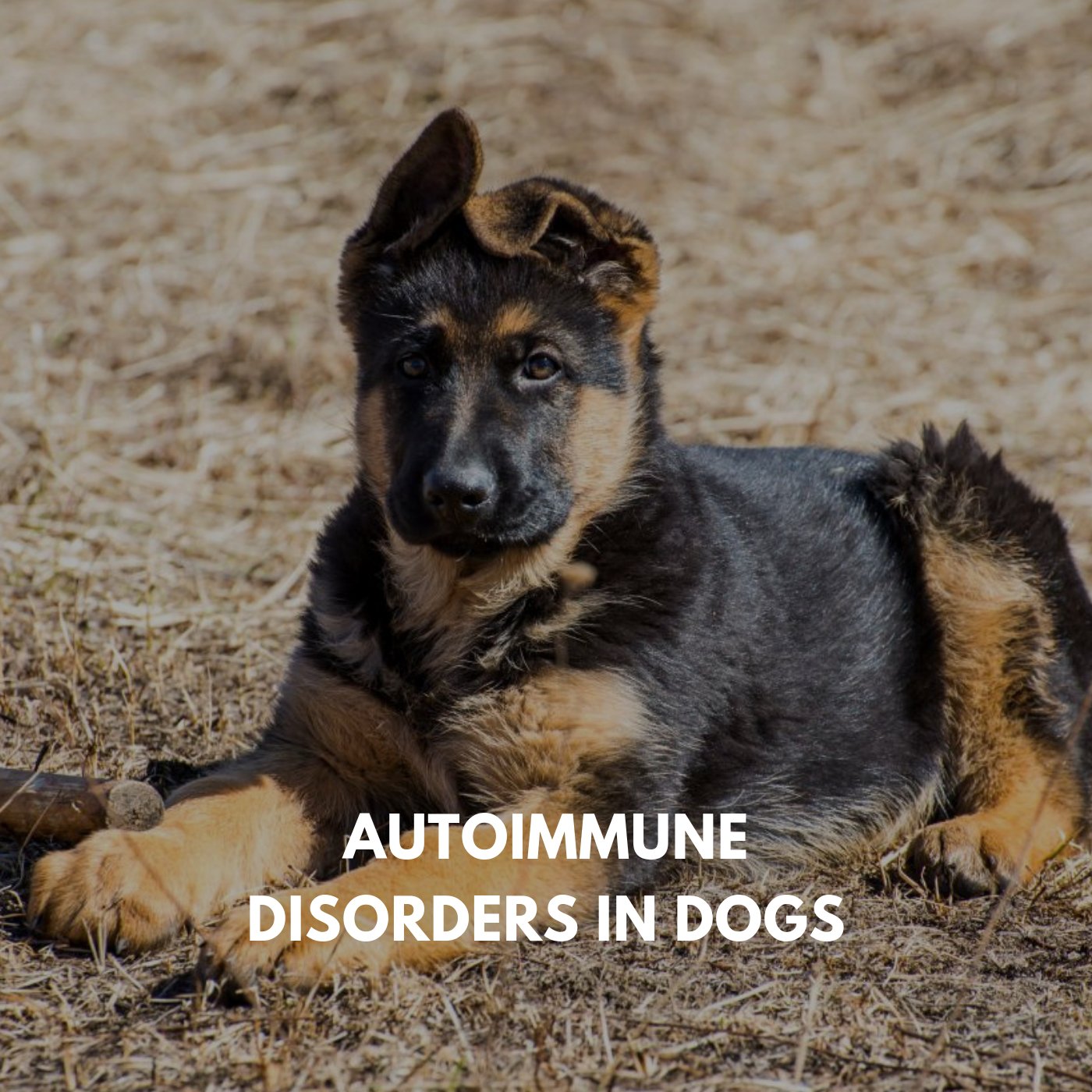Understanding Autoimmune Disorders In Dogs: Your Ultimate Guide
Autoimmune disorders in dogs can be a serious concern for any pet owner. Imagine this: your furry best friend suddenly starts showing strange symptoms—excessive itching, hair loss, or even swollen joints. It's enough to make your heart skip a beat. But before you panic, it's important to understand what autoimmune disorders are, why they happen, and how you can help your pup live a happy, healthy life.
Let's face it, autoimmune issues in dogs aren't exactly dinner table conversation. But they're a lot more common than you might think. Studies show that certain breeds, like German Shepherds and Cocker Spaniels, are more prone to these conditions. And while it's easy to get overwhelmed, knowing the facts can empower you to take charge of your dog's health.
Now, I know what you're thinking—"Is my dog really at risk?" The short answer is, it depends. Environmental factors, genetics, and even diet can play a role in triggering autoimmune disorders. But don't worry, we're here to break it all down for you. So grab a cup of coffee, and let's dive into the world of canine autoimmune health!
- Monroe County Dmv Henrietta Your Ultimate Guide To Smooth Transactions
- Why Whole Foods Berkeley Gilman Is A Mustvisit For Foodies And Health Enthusiasts
What Are Autoimmune Disorders in Dogs?
Alright, let's get technical for a second. Autoimmune disorders in dogs occur when the immune system goes rogue. Instead of protecting the body, it starts attacking its own cells and tissues. Think of it like a security guard gone bad—instead of keeping the bad guys out, they start locking up the good guys.
There are different types of autoimmune disorders, but they all share one common theme: confusion within the immune system. Some of the most common autoimmune disorders in dogs include lupus, rheumatoid arthritis, and hemolytic anemia. Each condition affects different parts of the body, but they all require careful management.
Here's the kicker—these disorders can be tricky to diagnose. Symptoms often overlap with other conditions, making it tough for even the most experienced vets to pinpoint the problem. That's why early detection and proper care are crucial.
- Ufc Newsletter Presale Your Ultimate Guide To The Hype And How To Get In On The Action
- New Allegiant Flights Your Ultimate Guide To Affordable Air Travel
Common Symptoms to Watch For
So, how do you know if your dog might have an autoimmune disorder? Well, the signs can vary depending on the specific condition, but there are a few red flags to keep an eye out for. Here's a quick list:
- Chronic skin problems, like excessive itching or hair loss
- Lethargy or lack of energy
- Swollen joints or difficulty moving
- Loss of appetite or weight loss
- Changes in behavior, like increased aggression or anxiety
Now, don't freak out if your dog shows one or two of these symptoms. A lot of other conditions can cause similar issues. But if you notice a combination of these signs, it's definitely worth scheduling a vet visit.
Causes of Autoimmune Disorders in Dogs
So, what causes autoimmune disorders in the first place? Well, the truth is, scientists still don't have all the answers. But they've identified a few key factors that might increase the risk:
- Genetics: Some breeds are more prone to autoimmune disorders due to their genetic makeup.
- Environmental factors: Exposure to toxins, pollution, or even certain medications can trigger an immune response.
- Diet: Poor nutrition or food allergies can weaken the immune system, making it more vulnerable to attacks.
Here's the thing—autoimmune disorders are complex. There's rarely just one cause. It's usually a combination of factors that leads to the development of these conditions.
Which Dog Breeds Are Most At Risk?
Let's talk breeds for a second. While any dog can develop an autoimmune disorder, some are more susceptible than others. Breeds like German Shepherds, Cocker Spaniels, and Poodles have a higher risk due to their genetic predisposition.
But why is that? Well, it all comes down to breeding. Over time, certain traits have been selectively bred into these dogs, sometimes at the expense of their health. This doesn't mean you should avoid these breeds altogether, but it does mean you need to be extra vigilant about their health.
Diagnosing Autoimmune Disorders in Dogs
Now, let's talk about diagnosis. This is where things can get a little tricky. Since autoimmune disorders often mimic other conditions, your vet will need to do some detective work to figure out what's going on.
The process usually starts with a thorough physical exam and a detailed history of your dog's symptoms. From there, your vet might recommend blood tests, urinalysis, or even biopsies to get a clearer picture.
Here's the deal—early diagnosis is key. The sooner you catch the problem, the better your dog's chances of managing the condition effectively.
Common Diagnostic Tests
So, what tests can you expect? Here's a quick rundown:
- Complete Blood Count (CBC): This test checks for abnormalities in the blood, like anemia or low white blood cell count.
- Biochemistry Profile: This test evaluates liver and kidney function, as well as electrolyte levels.
- Antinuclear Antibody (ANA) Test: This test looks for antibodies that attack the body's own cells.
Remember, no single test can diagnose an autoimmune disorder. It's usually a combination of tests and clinical observations that leads to a diagnosis.
Treatment Options for Autoimmune Disorders
Alright, let's talk treatment. Managing autoimmune disorders in dogs requires a multi-faceted approach. The goal is to suppress the immune system just enough to stop it from attacking the body, without leaving your dog vulnerable to infections.
Here are some of the most common treatment options:
- Medications: Corticosteroids, like prednisone, are often used to suppress the immune system. In severe cases, stronger immunosuppressive drugs may be needed.
- Dietary Changes: A balanced diet can help support your dog's immune system. In some cases, your vet might recommend a special diet to address food allergies or sensitivities.
- Supplements: Omega-3 fatty acids and other supplements can help reduce inflammation and support overall health.
It's important to work closely with your vet to develop a treatment plan that works for your dog. Every dog is different, so what works for one might not work for another.
Alternative Therapies
Now, if you're not a fan of conventional medicine, there are some alternative therapies worth considering. Acupuncture, herbal remedies, and even chiropractic care can help manage symptoms and improve quality of life.
But here's the thing—always consult your vet before trying any alternative therapies. Some treatments can interfere with traditional medications, so it's important to make sure everything is safe and effective.
Living with Autoimmune Disorders
So, what's life like for a dog with an autoimmune disorder? Well, it depends on the severity of the condition and how well it's managed. With the right care, many dogs with autoimmune disorders can live long, happy lives.
Here are a few tips for making life easier for your furry friend:
- Stick to a regular medication schedule
- Monitor symptoms closely and report any changes to your vet
- Provide a comfortable, stress-free environment
- Exercise regularly, but avoid overexertion
Remember, your dog's quality of life is just as important as their physical health. By creating a supportive environment, you can help them thrive despite their condition.
Emotional Support for Pet Owners
Let's not forget about you, the pet owner. Dealing with a dog's autoimmune disorder can be emotionally draining. It's okay to feel overwhelmed or frustrated at times. But remember, you're not alone.
Consider joining a support group or reaching out to other pet owners who are going through similar experiences. Sharing your story and learning from others can be incredibly helpful.
Preventing Autoimmune Disorders in Dogs
Now, here's the million-dollar question—can autoimmune disorders be prevented? The answer is, it's complicated. While you can't completely eliminate the risk, there are steps you can take to reduce it:
- Feed a balanced, high-quality diet
- Minimize exposure to toxins and pollutants
- Stay up-to-date on vaccinations and parasite prevention
- Regular vet check-ups to catch potential issues early
Remember, prevention is all about reducing risk factors. While you can't control everything, taking these steps can help keep your dog healthy and happy.
Future Research and Developments
Finally, let's talk about the future. Scientists are constantly working to better understand autoimmune disorders in dogs. New treatments and diagnostic tools are on the horizon, offering hope for pet owners everywhere.
Stay informed about the latest developments by following reputable sources and keeping in touch with your vet. Knowledge is power, and the more you know, the better equipped you'll be to care for your furry friend.
Conclusion
Autoimmune disorders in dogs can be a challenging condition to manage, but with the right care and support, your furry friend can live a fulfilling life. From understanding the causes to exploring treatment options, every step you take is a step towards better health for your dog.
So, here's what you need to remember: early detection is key, proper treatment makes a difference, and emotional support for both you and your dog is crucial. Don't hesitate to reach out to your vet or a support group if you need help.
And hey, don't forget to share this article with other pet owners who might benefit from the information. Together, we can create a community of informed and caring dog lovers!
Table of Contents
- What Are Autoimmune Disorders in Dogs?
- Common Symptoms to Watch For
- Causes of Autoimmune Disorders in Dogs
- Which Dog Breeds Are Most At Risk?
- Diagnosing Autoimmune Disorders in Dogs
- Common Diagnostic Tests
- Treatment Options for Autoimmune Disorders
- Alternative Therapies
- Living with Autoimmune Disorders
- Emotional Support for Pet Owners
- Preventing Autoimmune Disorders in Dogs
- Future Research and Developments
- How To Apply Online At Wwwdcfslagov A Comprehensive Guide
- Matt Walsh Without Beard The Bold Transformation You Didnrsquot See Coming

Autoimmune Disorders in Dogs Proflax

The Suffering of Dogs with Disorders Animal Charity Animal

Autoimmune Disease in Dogs Four Main Causes & Treatment Plans Dogster